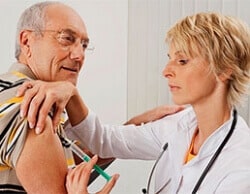
By Beth Fulford, ARNP
Recently, I sat watching a professional football game with my family. During a commercial break, an advertisement aired of a 60-something former pro quarterback urging the viewers to receive the herpes zoster, or shingles vaccine. My daughter asked if she had already had the vaccine, and it made me think that, although there is a growing recognition of the availability of the vaccine, maybe a little more clarification was needed on who, really, should be receiving the immunization.
Herpes zoster — commonly known as shingles — is a painful rash that is caused by the same virus that is responsible for chicken pox, a disease most commonly seen in children. After the chicken pox resolve, the virus stays in the body in a dormant, “comatose” condition. For many, years later, the virus “wakes up” and produces a new rash, and with it, the potential for complication. People have described pain from shingles as excruciating, aching, burning, stabbing, and shock-like. It has even been compared to the pain of childbirth or kidney stones.
The Center for Disease Control and Prevention’s (CDC) Advisory Committee on Immunization Practices actually recommends that all persons over the age of 60 receive the vaccine, regardless of a remembrance of having chicken pox as a child. The reason is simple: Although an outbreak of shingles is a painful event, the effects of the virus do not necessarily disappear when the skin lesions have gone. And lesions on an area of the body, such as the abdomen, flank (the fleshy part of the body between the ribs and hips) or back can be painful and leave behind nerve damage that serves as a very uncomfortable reminder of the outbreak. Lesions that occur around the eyes leave behind other effects that can be lifelong, resulting from the complication known as post-herpetic neuralgia. Nerve damage, which results from the virus, remains present, and can cause substantive pain and complications for months or even years after the outbreak has visibly cleared.
According to the CDC, every year, about one million cases of shingles are diagnosed in the United States. In persons who live to be 85 years of age, there is a 50-50 probability of an outbreak. And until fairly recently, there was little a person could do to protect against the painful and dreaded disease. However, in 2006, the herpes zoster vaccination was released and has been used in primary care clinics, health departments, and other health care sites since that time.
The vaccine itself is a one-time injection administered in the arm. There is no current guideline for a booster, so it is truly a one-time encounter. Unlike the flu vaccine, the herpes zoster injection is a live virus, so there are some individuals who cannot receive the vaccine, such as persons with immunocompromised systems or those on high-dose steroids. If you’re not sure whether you qualify for the vaccine, speak with your health care provider. If you do qualify, you are encouraged to receive the vaccine. Even if someone has had a prior outbreak of shingles, he or she can still receive the vaccine in hopes of minimizing the risk of a future outbreak. According to WebMD.com, one in three shingles sufferers will experience a recurrence.
Please consider encouraging your loved ones — parents, grandparents, friends — to receive the vaccine. Often a reassuring word from a family member can be the deciding factor in whether or not a therapy, or in this case a vaccination, is accepted. In fact, it is our desire At Copeland Medical Clinic to work as a team, with the patient at the center, and multiple supports surrounding each of them. And although there is customarily some degree of out-of-pocket cost, many insurance companies are recognizing the reduction in overall illness associated with herpes zoster and share the cost of the vaccine with the patient. The out-of-pocket cost varies from company to company, but can be determined by the pharmacy on an individual basis.
Further information on the CDC’s recommendations concerning shingles can be found online at www.cdc.gov/shingles/. By all means, do your research, but please consider helping us spread the word. On a “good day,” shingles are tough. On a “bad day,” they can genuinely be life changing.